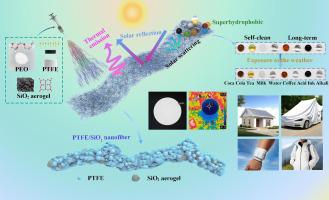Self-cleaning PTFE nanofiber membrane for long-term passive daytime radiative cooling
IF 13.2
1区 工程技术
Q1 ENGINEERING, CHEMICAL
引用次数: 0
Abstract
Passive daytime radiative cooling (PDRC) is an innovative, eco-friendly, and electricity-free cooling strategy that involves spontaneously cooling a surface by reflecting sunlight and radiating heat to cold outer space. Currently, many kinds of research focus on the effects of material design and structure construction on PDRC performance. However, the PDRC suffers a significant challenge of performance degradation arising from surface contamination and poor long-term outdoor durability. Herein, we developed a simple, efficient, and scalable strategy to prepare a superhydrophobic poly-(tetrafluoroethylene) (PTFE) nanofiber membrane (SNM-PTFE) with outstanding radiative cooling and self-cleaning performance for various practical applications. The SNM-PTFE has an average infrared emissivity of 95.8 % and reflects 95.4 % of solar irradiance. It brought about a sub-ambient cooling performance of ∼ 14.4 °C under direct sunlight. Moreover, it demonstrated excellent above-ambient cooling performance by reducing ∼ 9.5 °C under sunlight, which exhibited unprecedented heat dissipation and solar heat-shielding properties. The self-cleaning surface of SNM-PTFE maintained its good cooling performance after being exposed to outdoor conditions for a full month. SNM-PTFE showed great promise for PDRC, which can further extend the application for residential, industrial applications, and human thermal management.

用于长期日间被动辐射冷却的自清洁聚四氟乙烯纳米纤维膜
被动式日间辐射冷却(PDRC)是一种创新的、环保的、无需电力的冷却策略,它是通过反射太阳光并将热量辐射到寒冷的外层空间来自发冷却表面。目前,许多研究都侧重于材料设计和结构构造对 PDRC 性能的影响。然而,由于表面污染和长期户外耐久性差,PDRC 面临着性能退化的巨大挑战。在此,我们开发了一种简单、高效、可扩展的策略,制备了一种超疏水聚四氟乙烯(PTFE)纳米纤维膜(SNM-PTFE),它具有优异的辐射冷却和自清洁性能,可用于各种实际应用。SNM-PTFE 的平均红外发射率为 95.8%,可反射 95.4% 的太阳辐照。在阳光直射下,它的亚环境制冷性能可达 14.4 °C。此外,它还具有优异的高于环境温度的冷却性能,在阳光照射下温度降低了 9.5 °C,表现出前所未有的散热和太阳热屏蔽性能。SNM-PTFE 的自清洁表面在室外暴露一个月后仍能保持良好的冷却性能。SNM-PTFE 在 PDRC 方面显示出巨大的前景,可进一步扩展其在住宅、工业应用和人体热管理方面的应用。
本文章由计算机程序翻译,如有差异,请以英文原文为准。
求助全文
约1分钟内获得全文
求助全文
来源期刊

Chemical Engineering Journal
工程技术-工程:化工
CiteScore
21.70
自引率
9.30%
发文量
6781
审稿时长
2.4 months
期刊介绍:
The Chemical Engineering Journal is an international research journal that invites contributions of original and novel fundamental research. It aims to provide an international platform for presenting original fundamental research, interpretative reviews, and discussions on new developments in chemical engineering. The journal welcomes papers that describe novel theory and its practical application, as well as those that demonstrate the transfer of techniques from other disciplines. It also welcomes reports on carefully conducted experimental work that is soundly interpreted. The main focus of the journal is on original and rigorous research results that have broad significance. The Catalysis section within the Chemical Engineering Journal focuses specifically on Experimental and Theoretical studies in the fields of heterogeneous catalysis, molecular catalysis, and biocatalysis. These studies have industrial impact on various sectors such as chemicals, energy, materials, foods, healthcare, and environmental protection.
 求助内容:
求助内容: 应助结果提醒方式:
应助结果提醒方式:


